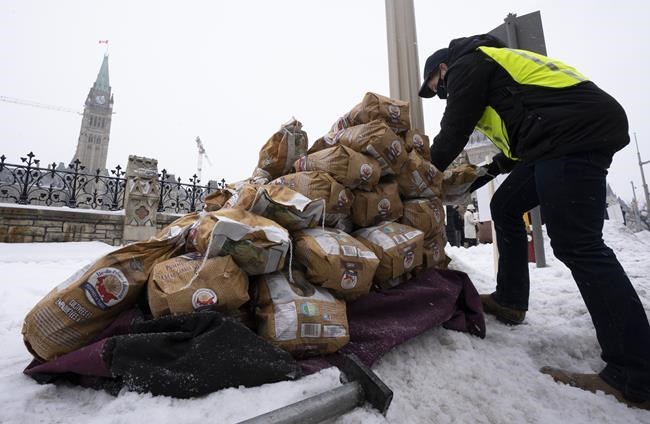CHARLOTTETOWN — Potato farmers in Prince Edward Island are feeling the impact of lost customers one year after a four-month ban of table potato shipments to the United States began.
Canada stopped sending the Island's best-known export to the U.S. on Nov. 21, 2021, after potato wart fungus — a disease that disfigures potatoes — had been detected in a few fields on the Island. The fungal parasite spreads through the movement of infected potatoes, soil and farm equipment but poses no threat to human health.
Shipments resumed in April after the U.S. Department of Agriculture gave Island farms the all-clear. But for farmers like Andrew Smith — whose property in Newton, P.E.I., produces potatoes for chips — the loss of long-term customers in the United States has had lasting consequences.
Smith said he lost a contract with a large U.S. company that changed suppliers during the export ban, adding that he's worried by renewed lobbying efforts from the U.S.-based National Potato Council, which is calling for more stringent packing requirements for P.E.I. exports.
"We lost that business and it's gone, and I would expect it's gone to an American grower who doesn't have to deal with protectionism at the border," he said.
Jordan Docherty, who retired from the military with plans to take over the family farm in Elmwood, P.E.I., said in an interview Monday it's discouraging that Ottawa is taking months to permit the shipping of seed potatoes from the province to markets elsewhere in Canada. Canada imposed a domestic seed potato export ban at the same time it imposed the U.S. ban.
Docherty, 33, said he and his 29-year-old brother, Logan Docherty, are interested in taking over the family business — which was started in 1848 — but the challenges are daunting. Jordan Docherty said the export ban forced one off-Island customer to start purchasing seed potatoes at higher prices from another seller, and as a consequence, "He's tapped out and says, 'I'm not going to grow anymore.'"
Jordan Docherty's father, Alex Docherty, estimated the impact of lost business from the border closure is "hundreds of thousands of dollars over my lifetime."
"My biggest customer called me last week from Ontario wanting to know if we're … going to be allowed to sell. But we don't know," Alex Docherty said in an interview Monday.
The limits placed on the export of P.E.I.’s most valuable crop is estimated to have cost the industry more than $50 million in revenue and forced farmers to destroy 250 million pounds of potatoes, according to the P.E.I. Potato Board.
Alex Docherty said that in the future, Ottawa should fight harder against the U.S. threats of border closures, rather than pre-emptively shutting down the industry. The federal Agriculture Department has said the original decision to stop exports was taken to pre-empt an all-out ban by the U.S. after the fungus was detected in 2021.
Seed potatoes, which comprise roughly 10 per cent of the Island's annual output, are still banned from the United States pending the outcome of a more thorough U.S. Department of Agriculture review that could take years to complete.
Federal Agriculture Minister Marie-Claude Bibeau has defended last year's decision to halt exports, saying that if Ottawa hadn't acted, all P.E.I. potatoes could have faced a ban lasting months or years.
In a statement sent Monday, Bibeau added that while the Canadian Food Inspection Agency is completing its inquiry, "restoring full market access will require a strong plan to further prevent the spread of potato wart."
She said her ministerial order "will remain in place until further notice to ensure that risk pathways for the spread of potato wart are controlled in a manner that protects all of Canada."
Ottawa has also introduced a number of assistance programs to help farmers hit by the border closures, including about $28 million for the "surplus potato management response plan" to support potato producers affected by trade disruptions.
These funds support the diversion of surplus potatoes to processors, packers and food banks, and other markets, and provided support for costs associated with destroying the potatoes.
This report by The Canadian Press was first published Nov. 21, 2022.
— By Michael Tutton in Halifax.
The Canadian Press



